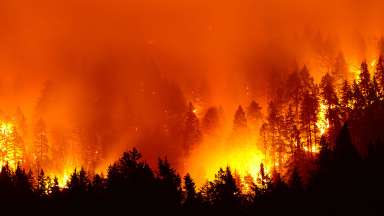Jump To:
A wildfire is an unplanned fire that burns in a natural area such as a forest or grassland. Risk of wildfire increases in periods of drought. Wildfires can be caused by humans or lightning strikes.
If you are under a Wildfire Warning, find shelter right away!
- Leave if told to do so.
- If trapped, call 911.
- Listen for emergency information and alerts.
- Use N95 masks to keep particles out of the air you breathe.
Risks from wildfires
- Danger to people and wildlife
- Property damage and destruction
- Flooding
Before a wildfire
- Sign up for your community’s warning system. The Emergency Alert System (EAS) and National Oceanic and Atmospheric Administration (NOAA) Weather Radio also provide emergency alerts.
- Keep important documents in a fireproof, safe place. Create password-protected digital copies.
- Use fire-resistant materials to build, renovate, or make repairs.
- Keep yards and roofs clear of leaves, pine needles, and debris that could help a wildfire spread to your home.
- Trim back shrubs and tree branches that come within five feet of the house.
- Review insurance coverage to make sure it is enough to replace your property.
During a wildfire
- Evacuate immediately if authorities tell you to do so.
- If trapped, call 911 and give your location, but be aware that emergency response could be delayed or impossible. Turn on lights to help rescuers find you.
- Listen to EAS, NOAA Weather Radio, or local alerting systems for current emergency information and instructions.
- Use dust masks to keep harmful particles out of the air you breathe.
- If you are not ordered to evacuate but smoky conditions exist, stay inside in a safe location or go to a community building where smoke levels are lower.
After a wildfire
- Listen to authorities to find out when it is safe to return and whether water is safe to drink.
- Avoid hot ash, charred trees, smoldering debris, and live embers. The ground may contain heat pockets that can burn you or spark another fire. Consider the danger to pets and livestock.
- Send text messages or use social media to reach out to family and friends. Phone systems are often busy following a disaster. Make calls only in emergencies.
- Document property damage with photographs. Conduct an inventory and contact your insurance company for assistance.
- Wildfires dramatically change landscape and ground conditions, which can lead to increased risk of flooding due to heavy rains, flash flooding, and mudflows. Flood risk remains significantly higher until vegetation is restored - up to five years after a wildfire. Consider purchasing flood insurance to protect the life you’ve built and to assure financial protection from future flooding.
- Check City of Raleigh website for information on debris collection.
Resources
Wildfire Safety Tips from Ready.gov
Information and knowledge resource on fire, electrical, and related hazards
